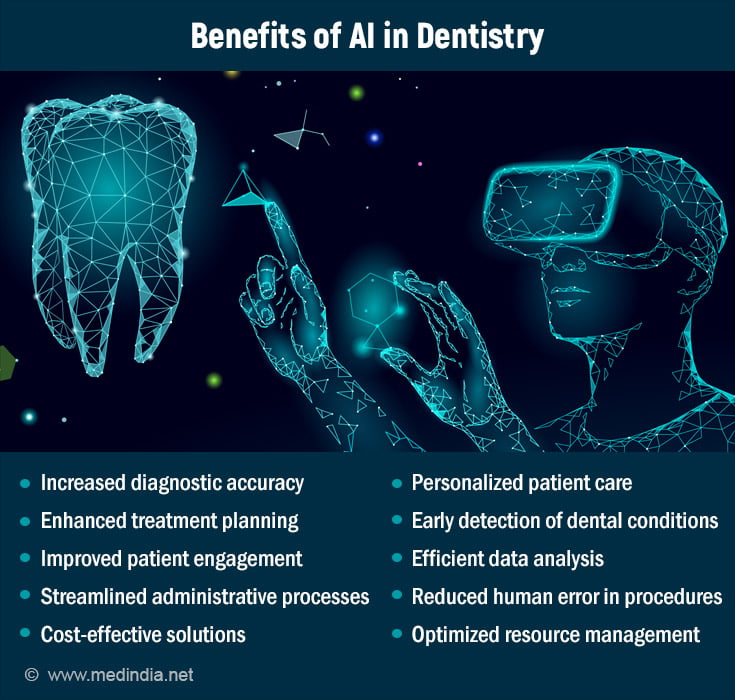- Artificial intelligence in dentistry-A review - (https://www.frontiersin.org/journals/dental-medicine/articles/10.3389/fdmed.2023.1085251/full)
Artificial Intelligence (AI) has brought transformative changes to diagnostic procedures in dentistry. Traditional diagnostic methods, often reliant on subjective interpretation, are now augmented by AI technologies. AI algorithms analyze dental images, such as X-rays and intraoral scans, with remarkable precision, detecting anomalies that might be missed by the human eye (1✔ ✔Trusted Source
Artificial intelligence in dentistry-A review
Go to source).
These advancements increase diagnostic accuracy and expedite the process, allowing for earlier detection of conditions like cavities, periodontal disease, and oral cancers.
Did You Know?
AI-driven diagnostics can detect dental anomalies with greater accuracy than the human eye! #medindia #dentalAI #dentistry
AI for Treatment Planning and Precision
AI has revolutionized treatment planning, enhancing the precision and efficiency of dental procedures. AI-driven software creates detailed, personalized treatment plans by analyzing patient data, including dental history, current oral health status, and anatomical structures. This technology aids in the precise planning of complex procedures such as dental implants, orthodontics, and restorative treatments.
AI enhances the overall patient experience in dental practices. AI-powered chatbots and virtual assistants provide instant responses to patient queries, schedule appointments, and offer post-treatment care instructions. These tools improve patient engagement and satisfaction by ensuring timely communication and reducing waiting times.
Benefits of AI Integration in Dental Practices
Increased Accuracy and Efficiency
AI integration brings significant benefits, including increased accuracy and efficiency. AI algorithms process and analyze vast amounts of data at a speed and accuracy level far beyond human capabilities. This results in more accurate diagnoses, streamlined treatment planning, and efficient administrative processes.
Cost-Effective Solutions
AI technologies offer cost-effective solutions for dental practices. By automating routine tasks and improving diagnostic and treatment accuracy, AI reduces the need for repeated procedures and minimizes errors, cutting operational costs and lowering financial burdens on patients.
Personalized Patient Care
AI provides personalized patient care by analyzing patient data to offer customized treatment plans and oral health recommendations. This personalization enhances patient engagement and adherence to treatment protocols.

Future Prospects of AI in Dentistry
The future of AI in dentistry holds exciting prospects with new technologies. Advancements in machine learning, natural language processing, and robotics will further revolutionize dental care. AI-driven robotic systems are being developed to assist in complex surgical procedures, providing unparalleled precision and reducing human error. AI-powered virtual reality (VR) and augmented reality (AR) tools are explored for dental education and training, offering immersive, hands-on learning experiences. These technologies promise to enhance dental care quality and expand dental professionals' capabilities.
AI in Radiology
AI significantly impacts radiology by enhancing the accuracy and efficiency of radiographic analysis. AI algorithms can identify abnormalities in dental X-rays, CT scans, and MRIs with high precision, aiding in the early detection of conditions like tumors, fractures, and infections. AI-driven imaging systems improve diagnostic capabilities and reduce the time needed for image interpretation, allowing radiologists to focus on more complex cases.
AI in Orthodontics
In orthodontics, AI optimizes treatment planning and monitoring. AI-powered software analyzes dental images to create precise, personalized orthodontic treatment plans. These systems predict tooth movement and simulate treatment outcomes, enabling orthodontists to design effective braces or aligners. AI also monitors treatment progress, providing real-time adjustments to ensure optimal results.
AI in Periodontics
AI assists periodontists in diagnosing and treating gum diseases. AI algorithms analyze periodontal data, including gum measurements and radiographs, to identify early signs of disease and recommend appropriate treatments. AI-driven tools can also predict patient responses to periodontal therapies, helping periodontists tailor treatments for better outcomes.AI in Prosthodontics
AI enhances prosthodontic procedures by improving the design and fabrication of dental prostheses. AI-driven CAD/CAM systems create precise digital models of crowns, bridges, and dentures, ensuring a perfect fit.
AI in Endodontics
In endodontics, AI aids in the diagnosis and treatment of root canal issues. AI-powered imaging systems can detect subtle signs of infection or damage in dental pulp and root structures.
AI in Oral and Maxillofacial Surgery
AI supports oral and maxillofacial surgeons in planning and performing complex surgical procedures. AI-driven surgical planning software analyzes patient data to create detailed surgical guides, enhancing precision during procedures like implant placement and corrective jaw surgery.
AI in Pediatric Dentistry
AI improves pediatric dentistry by offering tailored care for young patients. AI algorithms analyze pediatric dental data to predict growth patterns and identify early signs of dental issues. AI-driven tools provide personalized oral hygiene recommendations for children, promoting better oral health habits from an early age.
AI in Cosmetic Dentistry
In cosmetic dentistry, AI enhances the planning and execution of aesthetic treatments. AI-powered imaging systems create digital simulations of cosmetic procedures, allowing patients to visualize potential outcomes.
AI in Dental Public Health
AI supports dental public health initiatives by analyzing large datasets to identify trends and patterns in oral health. AI-driven predictive models can forecast the prevalence of dental diseases and inform public health strategies. AI tools also facilitate remote dental consultations and tele-dentistry, expanding access to care in underserved communities.
Challenges and Considerations of AI in Dentistry
Despite numerous benefits, AI integration in dentistry presents challenges and considerations. Data privacy and security are paramount, as AI involves handling sensitive patient information. Ensuring AI systems comply with regulatory standards and ethical guidelines is crucial.
Implementing AI requires significant investment in technology and training, which may pose a barrier for smaller practices. Ongoing research and validation ensure the reliability and accuracy of AI applications. Addressing these challenges is essential to fully harness AI's potential in transforming dental care.
AI is playing an increasingly important role in modern dentistry, offering numerous benefits across various dental specialties. From diagnostic accuracy to treatment precision and personalized patient care, AI is revolutionizing dental practices. Real-world applications and case studies highlight AI's transformative impact, while future technologies promise to further enhance dental care quality. Addressing associated challenges is crucial to fully harness AI's potential in transforming dental care.









